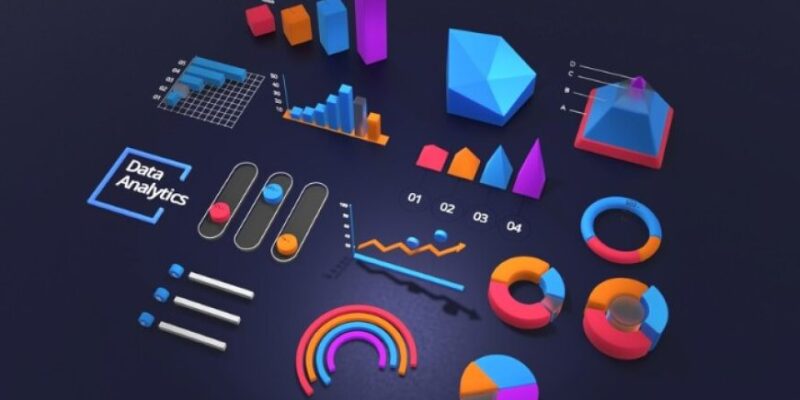
In the current highly competitive business environment, organizations are faced with an overwhelming amount of data. From customer transactions to interactions on social media, every action generates valuable information. However, merely collecting data is insufficient; businesses must utilize this information effectively to foster growth and innovation. This is where data analytics becomes essential. By converting raw data into actionable insights, data analytics empowers organizations to enhance decision-making, streamline operations, and ultimately increase profitability.
Understanding Data Analytics
Data analytics involves the systematic computational analysis of data to uncover patterns, trends, and insights that inform business decisions. It encompasses various techniques and tools, ranging from basic statistical analysis to advanced machine learning algorithms. The primary aim of data analytics is to transform data into meaningful information that can drive strategic initiatives and help organizations achieve their objectives.
Data analytics can be categorized into four main types:
- Descriptive Analytics: This type analyzes historical data to provide insights into what has happened in the past. It helps businesses understand trends and patterns in their performance over time.
- Diagnostic Analytics: This goes deeper by examining historical data to uncover the reasons behind specific outcomes. By identifying the causes of events, organizations gain a more profound understanding of their operations.
- Predictive Analytics: This type utilizes statistical models and machine learning techniques to forecast future outcomes based on historical data. Predictive analytics allows businesses to anticipate trends, customer behaviors, and potential challenges.
- Prescriptive Analytics: This advanced form of analytics offers recommendations based on data analysis. It provides organizations with actionable insights and strategies to achieve desired results.
The Business Case for Data Analytics
Harnessing data analytics can transform a business in several significant ways:
1. Enhanced Decision-Making
Data analytics empowers organizations to make informed decisions based on empirical evidence. By analyzing data trends and patterns, businesses can identify opportunities and mitigate risks. For instance, a retail company can evaluate customer purchasing behavior to optimize inventory levels, ensuring that popular products are consistently available. Similarly, data analytics can help identify operational inefficiencies, enabling streamlined processes and cost savings.
2. Improved Customer Insights
Understanding customers is vital for any business. Data analytics provides organizations with deep insights into customer preferences, behaviors, and needs. By analyzing data from various touchpoints—such as website interactions, social media engagement, and purchase history—businesses can create detailed customer profiles. This information can be utilized to tailor marketing strategies, personalize customer experiences, and improve retention rates.
For example, a streaming service can analyze viewing habits to recommend content aligned with users’ preferences, ultimately enhancing user satisfaction and loyalty.
3. Increased Operational Efficiency
Data analytics can significantly boost operational efficiency by identifying bottlenecks and optimizing processes. By monitoring key performance indicators (KPIs) and analyzing operational data, businesses can uncover workflow inefficiencies. For instance, manufacturers can leverage data analytics to monitor production processes, identify equipment malfunctions, and optimize maintenance schedules, leading to reduced downtime and increased productivity.
4. Competitive Advantage
In a fast-paced marketplace, staying ahead of the competition is crucial. Data analytics enables organizations to monitor market trends, competitor performance, and customer sentiment. By leveraging this information, businesses can adapt strategies, innovate offerings, and position themselves effectively in the market. Companies that utilize data analytics can identify emerging trends before their competitors, allowing them to capitalize on new opportunities.
5. Risk Management
Data analytics plays a crucial role in risk management by enabling organizations to identify potential risks and implement proactive measures. For example, financial institutions use data analytics to detect fraudulent transactions by analyzing customer behavior patterns. By flagging unusual activities in real-time, organizations can take immediate action to mitigate risks and protect their assets.
Implementing Data Analytics in Your Business
To transform your business with data analytics, a systematic approach is required:
1. Define Your Objectives
Before diving into data analytics, it’s vital to establish clear objectives. What specific challenges are you aiming to address? What insights do you hope to derive? By setting well-defined goals, you can focus your data analytics efforts on areas that will yield the most value for your business.
2. Collect and Organize Data
Data serves as the foundation of analytics. Collect information from various sources, including customer interactions, sales transactions, website analytics, and social media engagement. Ensure that the data is accurate, relevant, and well-organized. Implement data governance practices to maintain quality and integrity.
3. Choose the Right Tools
Select data analytics tools that align with your business requirements. There are numerous software options available, ranging from user-friendly platforms like Tableau and Power BI to more complex tools that may require specialized expertise. Consider factors such as scalability, usability, and integration capabilities when choosing analytics tools.
4. Build a Skilled Team
A successful data analytics initiative requires skilled professionals who can analyze data, interpret results, and provide actionable insights. Invest in training and development for your team or consider hiring data analysts and data scientists with expertise in analytics and statistical modeling.
5. Analyze and Interpret Data
Once you have collected and organized your data, it’s time to analyze it. Utilize descriptive, diagnostic, predictive, and prescriptive analytics techniques to uncover insights. Visualization tools can help present data clearly, making it easier for stakeholders to grasp key findings.
6. Make Data-Driven Decisions
Utilize the insights gained from data analytics to inform decision-making. Develop strategies based on empirical evidence rather than intuition. Monitor the outcomes of your decisions and adjust your strategies based on data feedback.
7. Continuously Improve
Data analytics is an ongoing process. Continuously collect data, analyze results, and refine your strategies. Stay updated on emerging trends and technologies in data analytics to ensure your business remains competitive.
Real-World Success Stories
To illustrate the transformative power of data analytics, here are some real-world examples:
1. Amazon
Amazon exemplifies a company that effectively leverages data analytics to drive its business strategy. The e-commerce giant analyzes customer behavior, purchase history, and browsing patterns to personalize recommendations and enhance the shopping experience. By utilizing predictive analytics, Amazon can forecast product demand, optimize inventory management, and reduce delivery times. This data-driven approach has established Amazon as a leader in the retail industry.
2. Netflix
Netflix employs data analytics to enhance user experience and guide content creation. By analyzing viewing habits and preferences, Netflix can recommend shows and movies that align with individual users’ tastes. Additionally, data analytics informs content production decisions, allowing Netflix to invest in projects likely to resonate with its audience. This strategy has significantly contributed to Netflix’s rapid growth and global success.
3. Target
Target is well-known for using data analytics to predict customer behavior. By analyzing purchasing patterns, the retailer identified customers likely to be pregnant based on their shopping habits. Target then created personalized marketing campaigns, sending tailored coupons and advertisements to expectant mothers. This strategic use of data analytics led to increased customer loyalty and higher sales.
The Future of Data Analytics
As technology continues to advance, the role of data analytics in business will only become more critical. Emerging technologies, such as artificial intelligence and machine learning, will enhance analytics capabilities, enabling organizations to derive even deeper insights from their data.
Moreover, the rise of big data will create new opportunities and challenges for businesses. Organizations will need to invest in advanced analytics tools and strategies to manage and make sense of the vast amounts of data generated daily.
Additionally, data privacy and ethical considerations will play a vital role in shaping the future of data analytics. As consumers become more aware of how their data is utilized, businesses must prioritize data privacy and ensure that their analytics practices are ethical and transparent.
Conclusion
In an age where data is often referred to as the “new oil,” organizations must harness the power of data analytics to thrive. By transforming raw data into actionable insights, businesses can enhance decision-making, improve operational efficiency, and uncover new growth opportunities. To effectively leverage data analytics, it is essential for organizations to invest in the right tools and talent. Enrolling in the best Data Analytics course in Delhi, Noida, Gurugram, Mumbai, Navi Mumbai, Thane, and other cities across India can equip professionals with the necessary skills to analyze data effectively and drive strategic initiatives.
The journey to becoming a data-driven organization requires commitment and a continuous focus on leveraging data for strategic advantage. As businesses navigate the complexities of the digital age, embracing data analytics will be crucial for unlocking innovation and maintaining competitiveness. By transforming their approach to data, organizations can not only survive but also thrive in an ever-evolving marketplace.











